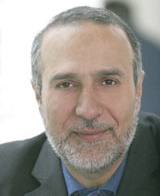Iraq’s Parliamentary Election and the Lessons Learnt

From whatever point we look at Iraq’s parliamentary election, one thing can’t be denied: the key winner was the Iraqi nation that showed a massive turnout to determine its political future despite suffering occupation and at a time when security circumstances are at the ebb. Neither the foreign occupying forces nor the ruling coalition of Nuri Maliki could attribute this victory to their own actions. Americans may be pleased with the result of election, but no one can claim they engineered the poll to gain their desired outcome.
It was like a soccer match: up to the last minute, Prime Minister and Commander of Armed Forces Nuri Maliki believed that he had won the election, but the score of the match changed in the last moments. I don’t want to claim there were no vote-riggings in the election, and you can’t find any countries around the world in which fraud-proof elections could be held, but the manipulations in the Iraqi parliamentary poll were definitely insignificant and had no impact on the final result.
As Prophet Mohammad (pbuh) and Imam Ali (as) have said, wisdom should be learnt even from hypocrites. This is the saying all regional states should now hear. No Arab country in Middle East can be found that holds such free elections with the minimum fraud. Who becomes the next prime minister of Iraq should not be the concern of either Iran or any other regional state. If our diplomatic body thinks that petrodollars, Saudi Arabia and Jordan, Damascus-residing Baathists or other Arab countries (who couldn’t hide their joy in Arab League Conference in Libya) helped Ayad Allawi win the election, there are definitely wrong.
Distribution of votes among the four major coalitions also has a profound significance: although Shiites constitute 70 percent of the Iraqi population, two key blocs, Rule of Law led by Nuri Maliki and National Alliance co-led by Ammar Hakim and Muqtada Sadr have gained less than fifty percent of the votes. This is a point which calls for close analysis by observers. One may be leaders’ inability to reach a compromise.
The most important point however is the role of Grand Ayatollah Sistani during the election. Ayotallah’s good name will no doubt remain in the Iraqi history forever. Despite his undying devotion to the Shiite Imams and his natural inclination towards religious parties which defend Shiite values in a country that hosts the shrine of many Shiite Imams, he never let himself to lower the prestige of religious leadership (marja’iyyat) with direct involvement in politics. The respect Grand Ayatollah Sistani showed for Iraqis’ vote will elevate the position of religious leaders in Iraq.
Howsoever Iraq’s future turns out –regarding the present fragile security circumstances- and whatsoever coalition comes to power, there is no doubt that safeguarding the interests of the Iraqi nation and polite expulsion of occupying forces is possible only under the rule of a democratic government that represents the Iraqi nation. Otherwise we should wait for another Afghanistan, this time on our Western borders, or maybe a replica of Saddam Hussein.

